Last Updated: 1 year ago
Weaning kittens is an important part of feline development and should not be overlooked.
It’s a process that can have both positive and negative effects on the health and well-being of your cat, so it’s important to understand why, how, and when to wean kittens.
So if you’re a cat owner looking for more information about weaning kittens, read on!
When to Wean Kittens From Their Momma
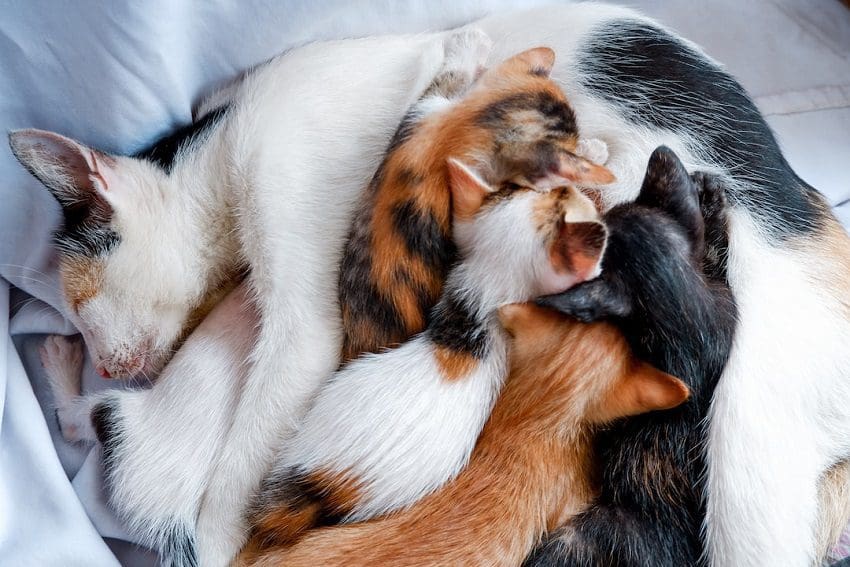
As a cat owner with a new litter, you may be wondering when to wean kittens from their mothers.
The timing of weaning can have long-term effects on the health and well-being of your kittens.
Weaning occurs when a kitten begins to eat solid food instead of relying solely on its mother’s milk for nutrition.
Kittens are typically ready to begin eating solid foods at around 4 weeks old, but it’s important to note that this varies depending on breed and individual kitten development.
Generally speaking, most kittens will start showing interest in solid food by 5 or 6 weeks old, although some breeds may take longer than others before they are ready for solids.
The benefits of early weaning include:
- Improved digestion due to increased exposure to different types of bacteria found in solid food.
- Better absorption of nutrients.
- Stronger bones and teeth.
- Improved immunity against disease.
- More independence from their mothers as they become more self-sufficient.
Early weaning also allows cats to develop social skills earlier, including litter box training.
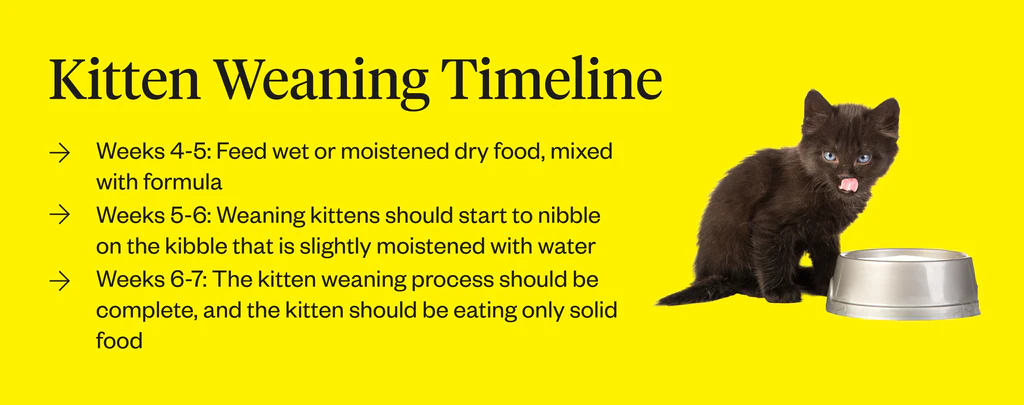
On the other hand, late weaning can lead to:
- Malnutrition due to inadequate nutrient intake during critical growth periods.
- Weaker bones and teeth could lead to problems later in life.
- Weaker immunity against diseases.
- Poor socialization skills
- Obesity due to overfeeding.
It’s important that you monitor your kittens closely so that you know when they’re ready for solids, which is usually between 4-6 weeks old.
How to Wean Kittens
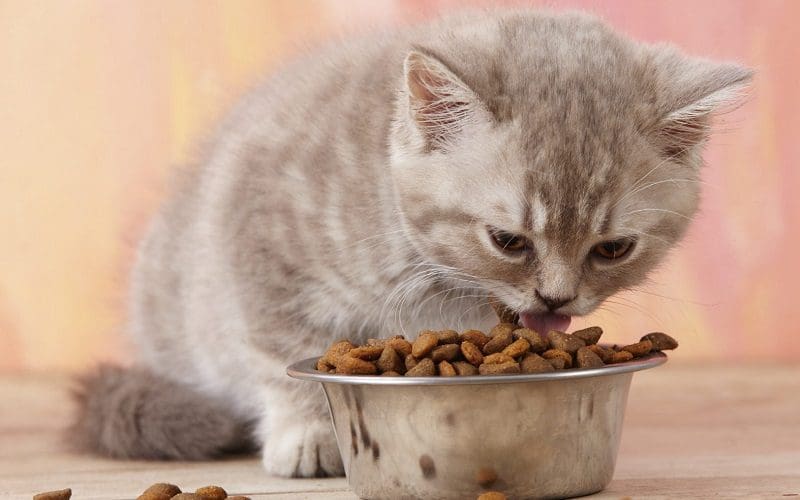
It’s best to start the weaning process when your kitten is around 4 weeks old.
At this age, they are still getting most of their nutrition from their mother’s milk but are starting to explore solid foods like wet food or soft kibble.
1. Buy High-Quality Cat Food
Make sure you offer them high-quality cat food that has been specifically formulated for kittens.
They should get all the nutrients they need during this crucial stage in their growth and development.
2. Introduce Solid Foods Slowly
Once you have chosen a suitable cat food for your kitten, begin introducing small amounts into their diet gradually over several days or even weeks if necessary.
Begin by mixing small amounts of wet food with formula or breastmilk until eventually there is more solid than liquid at each mealtime.
This helps make sure that your kitten gets used to eating solids without feeling overwhelmed by large portions right away.
3. Offer Variety
As you continue with the weaning process, try offering different types of wet foods, such as canned tuna or salmon mixed with kibble.
It’s important that your kitten gets used to different textures and flavors while still receiving all the essential nutrients they need at this age.
You can also add warm water to dry kibble to help soften it up before feeding time.
4. Monitor Progress Carefully
Throughout the entire weaning process, keep an eye on any signs of distress, such as vomiting after meals or a lack of appetite.
These could indicate something isn’t quite right and may require veterinary attention immediately.
Additionally, monitor how much weight your kitten gains during this period. Ideally, they should gain about 5 ounces per week until reaching adulthood at 12 months old.
If there are any concerns regarding weight gain or loss, consult with a vet right away!
Benefits of Early Weaning
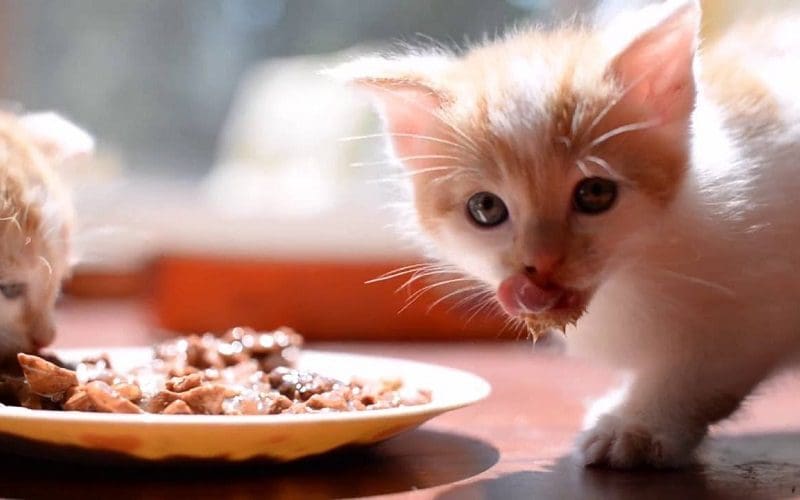
Cats are incredibly independent animals, but when it comes to weaning kittens, a little help from their owners can go a long way.
Weaning is the process of transitioning kittens from their mother’s milk to solid food. Early weaning has numerous benefits for both cats and their owners.
For starters, early weaning helps kittens socialize more easily with other cats and humans in the household. This is because they become accustomed to being away from their mother.
Early-weaned kittens tend to be less picky eaters as adults since they have already been exposed to various flavors and textures during this important stage of development.
Early weaning also offers health benefits for your cat later in life.
Kittens that are transitioned off their mother’s milk earlier tend to be leaner than those who remain on it longer.
They are able to maintain a healthy weight throughout adulthood, which reduces their risk of obesity-related illnesses such as diabetes and heart disease.
By introducing your kittens early to the home environment, you can ensure that your new family member stays safe while getting used to their new surroundings.
Risks of Late Weaning
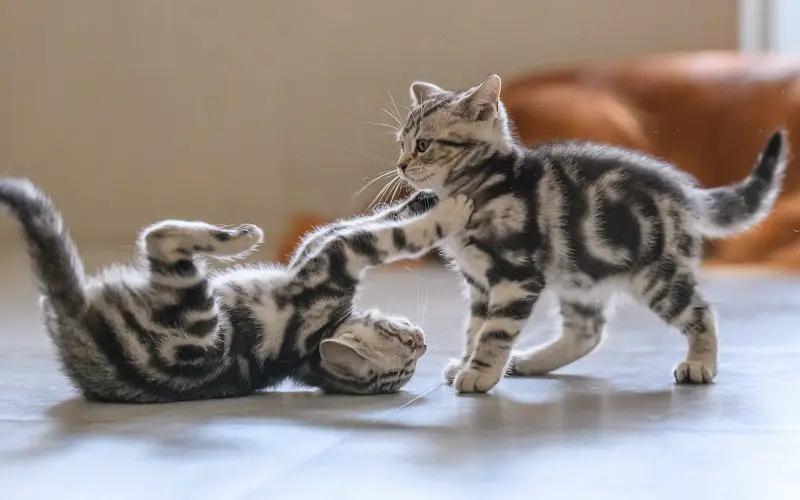
Malnutrition is one of the most common problems seen in kittens that are weaned late. They may not receive enough nutrition from their mother’s milk if solid food is introduced too late.
Dehydration can occur due to inadequate access to water or other fluids during this period.
Late-weaned kittens may also have difficulty socializing with other cats and can be more prone to aggression because they were unable to learn appropriate behavior at an early age.
Furthermore, they may struggle with litter box training as they haven’t had time to learn proper elimination habits while still nursing from their mother.
If you plan to adopt a kitten under 8 weeks old, make sure that they are properly weaned before bringing them home so these issues don’t arise later down the line.
Conclusion
Kittens should be weaned from their mother’s milk at around 8 weeks old, but this can vary depending on the breed and individual kitten.
Early weaning can provide a number of benefits, including increased socialization and better health outcomes.
However, late weaning can also lead to some risks, such as poor nutrition or even death in extreme cases.
Ultimately, it’s up to you to decide when to wean your kittens, but always make sure that they are healthy and well-cared for during this process.
References:
